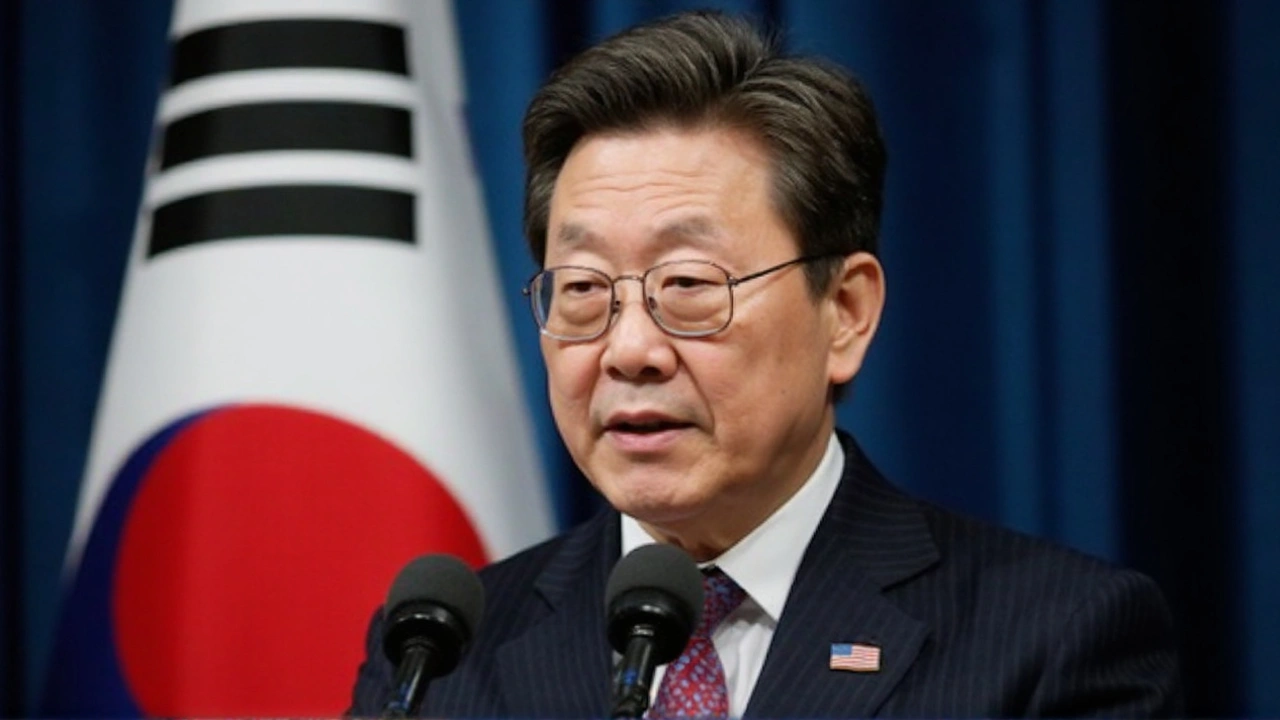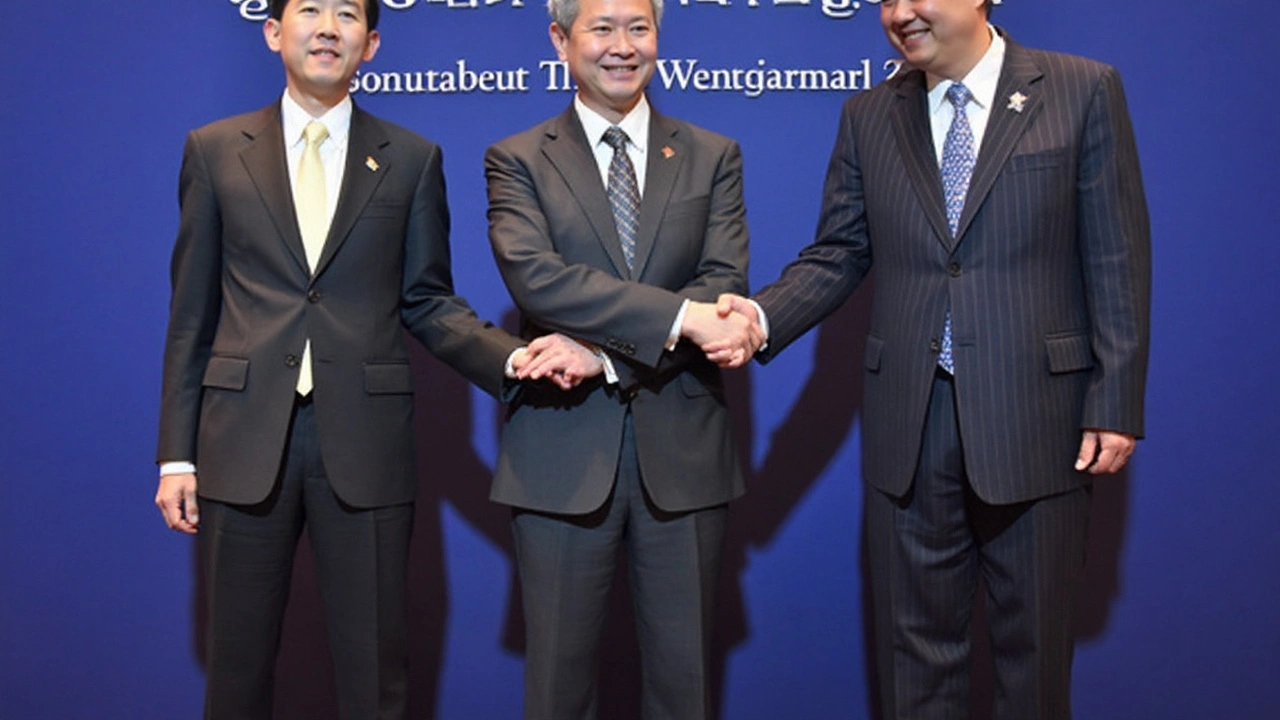Trade Rivals Join Forces: The Return of Free Trade Talks
Five years is a long time in international trade, especially when three of Asia’s biggest economies have been sitting on an unfinished deal. In March 2025, free trade agreement talks between China, Japan, and South Korea restarted after their long silence. It's pretty clear what’s behind this sudden push: new tariffs from the US, ramped up by President Trump, have sent a chill through boardrooms and government offices across Asia. This time, these rivals aren’t just talking—they’re scrambling for something concrete.
The energy in Seoul during that March meeting was palpable. South Korea’s Ahn Duk-geun, China’s Wang Wentao, and Japan’s Yoji Muto met face-to-face and made a pact to revive negotiations that had gone nowhere since 2012. That’s more than a decade of failed summits, half-hearted statements, and endless rounds of blame-game. So why did things finally crack open? American tariffs—some of the biggest since the Great Depression—forced these countries to recognize they’d better work together rather than face economic headwinds alone.
Since the last round of trilateral enthusiasm ended, the global landscape has shifted. The three countries already share space in the big Regional Comprehensive Economic Partnership (RCEP), the massive Asia-Pacific trade pact set up in 2021. But RCEP isn’t enough. The economic ties binding China, Japan, and South Korea are unique—just look at South Korea’s exports to China, which hit $230 billion back in 2013. Policymakers now want to go deeper, building a deal that actually reflects how much their economies mesh, rather than just copying the RCEP blueprint.

Under the Hood: What’s Driving the Talks
This isn’t just about tariffs and trade deficits. In Seoul, ministers got straight down to the issues that have a daily impact on factories, tech start-ups, and energy companies: how to keep supply chains stable; how to move faster on export controls in a complicated world; how to pool brainpower for things like carbon-neutral energy and new digital markets.
It sounds sensible on paper, but the path isn’t smooth. Take Japan and South Korea, for example—historic baggage from World War II hasn’t just vanished, and trade rows have flared up over everything from chemicals to high-tech screens. Meanwhile, China brings both opportunities and anxieties to the table, with its assertive foreign policy raising eyebrows in Tokyo and Seoul alike. The last serious push for this FTA fizzled out in 2019; it took a common threat from outside—US protectionism—to change their tune.
Still, the countries are promising faster action than before. Though none of the ministers gave a specific timeline for a final FTA, they outlined steps to sync up during upcoming regional events. South Korea, for example, will host leaders during the 2025 APEC week, while Japan is prepping its Expo 2025. Another big meeting, the Pan-Yellow Sea Rim Economy and Technology Exchange, is on for November 2025 in Daejeon—more proof that the wheels are turning, at least diplomatically.
Yet, public doubts haven’t gone away, especially in Japan and South Korea, where voters worry about domestic industries and rising Chinese influence. These talks show that pragmatism has the upper hand for now, but as the details get hammered out, old suspicions could come roaring back.
If anything, the revival of these FTA negotiations shows that while the US’s tariffs might be intended to bring business home, they’ve triggered Asian powerhouses to work together like never before. What started as a defensive move might end up reshaping trade routes, supply chains, and economic alliances for years to come.






lol at the US acting like it's surprised Asia found each other again. we've been dumping tariffs like confetti and now they're holding hands? classic.
This is exactly how the deep state weakens America. Letting our rivals form economic blocs while we bleed manufacturing jobs. It's not coincidence-it's betrayal.
The irony is not lost: the very liberalization the US once championed is now being weaponized against it. One wonders whether the decline of American hegemony is a structural inevitability or merely the consequence of strategic incompetence.
I bet the media won't tell you that South Korea's tech giants are already outsourcing more to China than they ever did to us. This isn't cooperation-it's surrender.
People keep talking about tariffs as if they're the root cause, but the real issue is the collapse of multilateralism. The US used to lead institutions like the WTO-now it's just a noisy spectator. These three countries aren't just reacting to tariffs; they're rebuilding a system we abandoned.
I swear if Japan and South Korea sign this, I'm moving to Canada.
Honestly, this is kind of beautiful if you think about it-three nations that spent decades trading barbs and historical grievances are now sitting down to talk about carbon-neutral supply chains and digital trade rules. It’s not perfect, and yeah, there’s still a ton of mistrust, but the fact that they’re even trying? That’s the kind of quiet diplomacy we don’t see enough of anymore. You don’t need to love each other to build something that outlasts your differences.
I think this is a great step forward 🤗 even tho i dont know much about trade i just know that peace through econonmics is better than war 🤞
I’ve been watching this for years and honestly, I’m just glad they’re talking again. Even if it’s messy, even if it’s slow, the fact that they’re finding common ground on tech and green energy? That’s huge. We forget sometimes that economies don’t have to be zero-sum. Maybe this is the start of something that doesn’t revolve around who’s winning, but who’s building something that lasts.